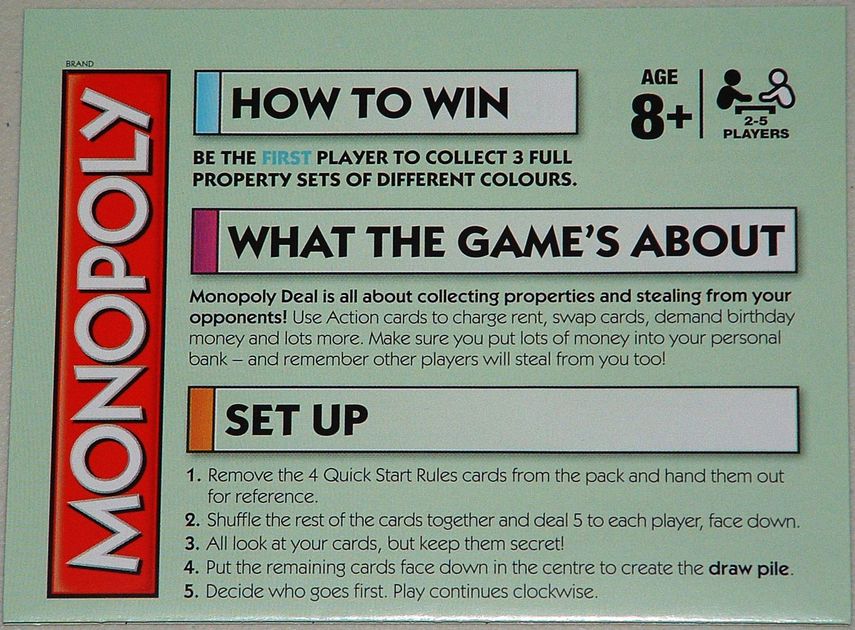

There are three possible ways to go to jail: X Research source Going to jail prevents you from moving around the board until you're free, but you still can collect rent, buy houses, participate in auctions, and trade with other players. Play a public game with strangers, or play a private game with friends.

Monopoly is intended to be played by people aged 8 or over.However, it can feel like you’re at a real disadvantage if you’re one of the last players to go. 6-8 player games: these take the longest to play, and there’s going to be a lot of time between turns.

There's a lot of room for the losing players to stay in the game. 3-5 player games: these games tend to be well balanced for fairness and enjoyment.

Once someone gets lucky or makes a great move, they usually win the game without a Chance for their opponent to catch up.
#Official monopoly rules series#
He was the winner of the Paul Carroll award for outstanding achievement in creative writing in 2014, and he was a featured reader at the Poetry Foundation’s Open Door Reading Series in 2015. His digital chapbook, The Internet, was also published in TL DR Magazine. A former educator and poet, his work has appeared in Carcinogenic Poetry, Shot Glass Journal, Prairie Margins, and The Rusty Nail. Eric McClure is an editing fellow at wikiHow where he has been editing, researching, and creating content since 2019. Examples include: conspiracies to defraud the United States, mail and wire fraud, money laundering, kickbacks, false statements to Federal agents, perjury, and obstruction of justice, and bribery, among other crimes.This article was co-authored by wikiHow staff writer, Eric McClure. The Antitrust Division also enforces other federal laws to fight illegal activities that arise from anticompetitive conduct, which includes offenses that impact the integrity of an antitrust or related investigation. The Act also allows the United States to recover treble damages when it has suffered injuries as a result of a violation. The Clayton Act also prohibits other business practices that may harm competition such as exclusive contracts, requirements ties that require a customer to buy additional products or services from a seller, or serving as a director for a competitor. All persons considering a merger or acquisition above a certain size must notify both the Antitrust Division and the Federal Trade Commission that they intend to transact. This law prohibits mergers or acquisitions whose effect may be to substantially lessen competition. Monopolization offenses may be prosecuted criminally or civilly. An unlawful monopoly exists when one firm has market power for a product or service, and it has obtained or maintained that market power, not through competition on the merits, but because the firm has suppressed competition by engaging in anticompetitive conduct. The Sherman Act also makes it illegal to monopolize, conspire to monopolize, or attempt to monopolize a market for products or services. Other agreements such as exclusive contracts that reduce competition may also violate the Sherman Antitrust Act and are subject to civil enforcement. Under the Sherman Act, agreements among competitors to fix prices or wages, rig bids, or allocate customers, workers, or markets, are criminal violations. This law prohibits conspiracies that unreasonably restrain trade. These laws prohibit anticompetitive conduct and mergers that deprive American consumers, taxpayers, and workers of the benefits of competition. The Antitrust Division enforces federal antitrust and competition laws.


 0 kommentar(er)
0 kommentar(er)
